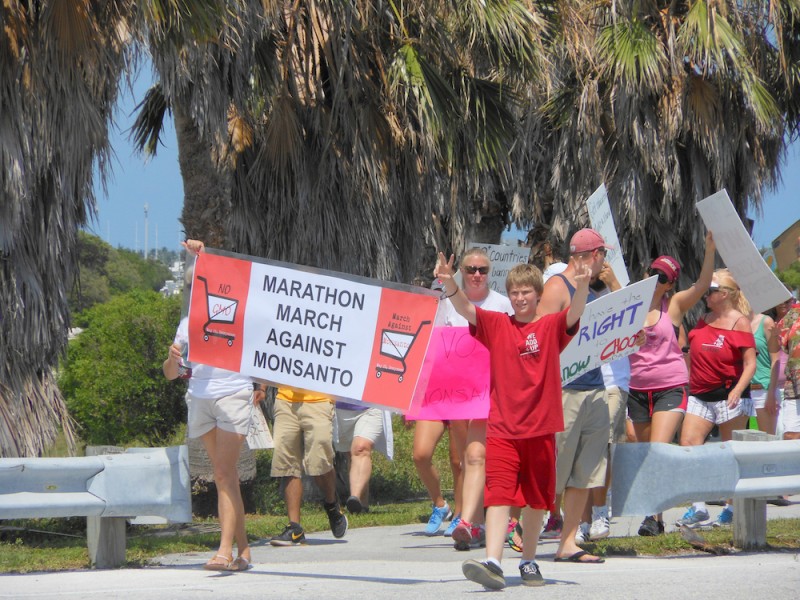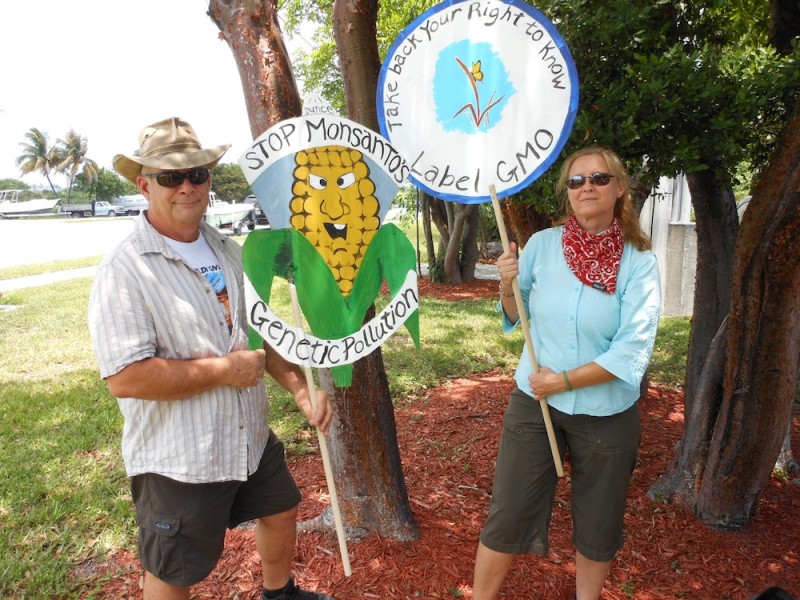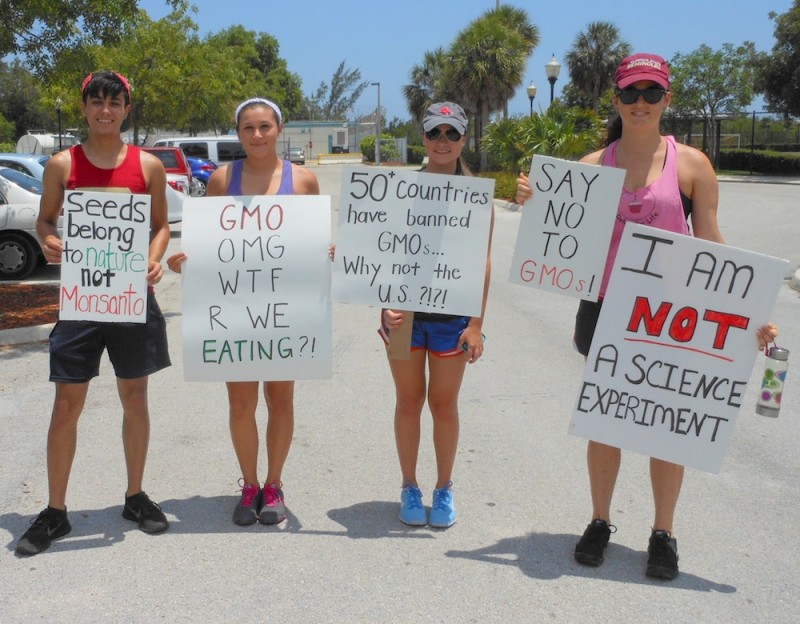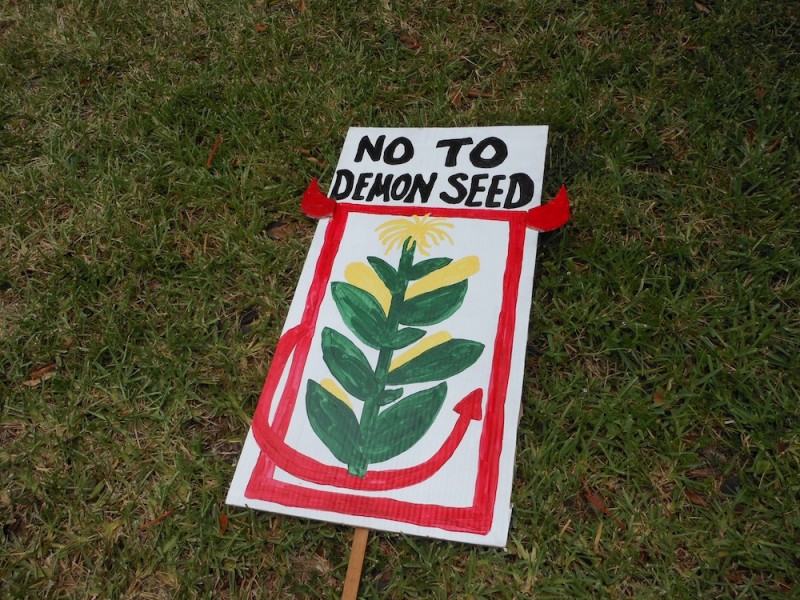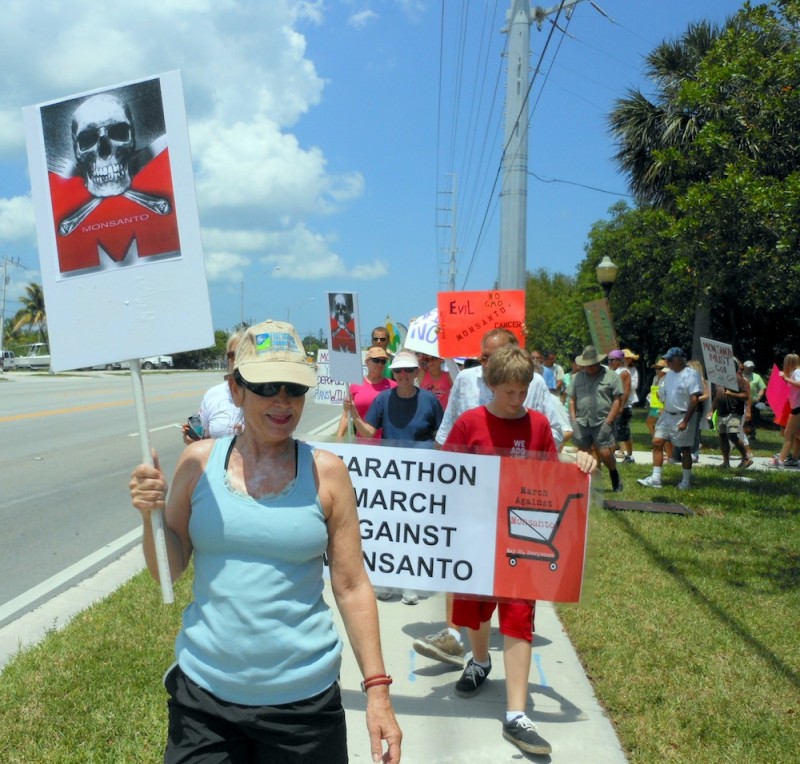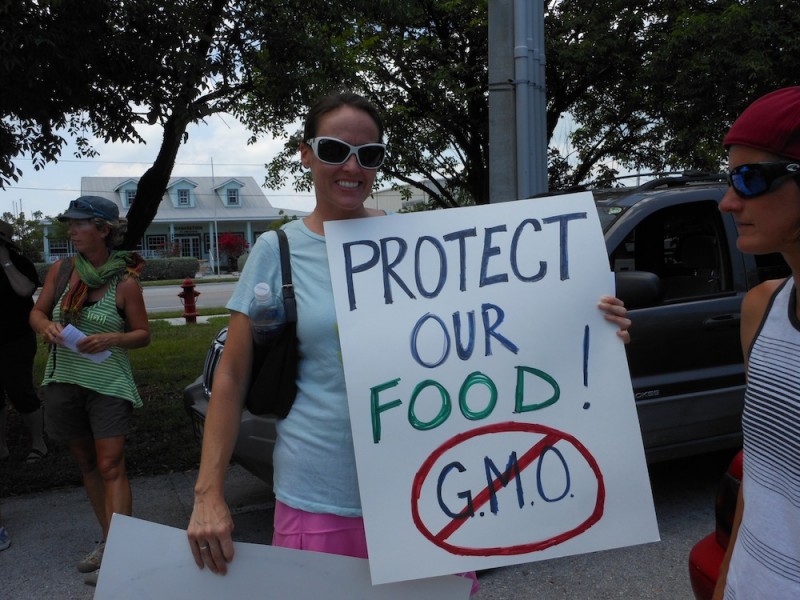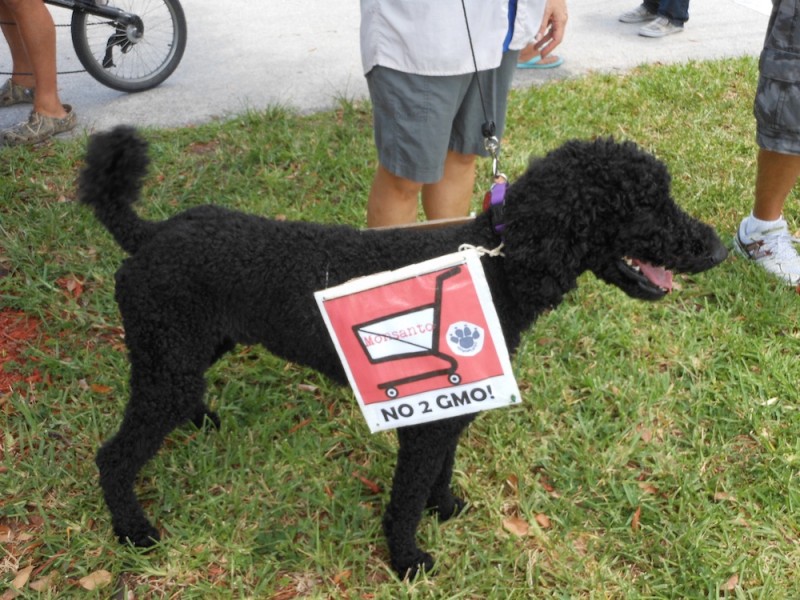Marathon March Against Monsanto
Sometimes ridiculed as Apathyville, Marathon is not known for citizen activism. So it was a major surprise, even startling the organizers, that more than 70 people turned out for the recent March Against Monsanto. The group gathered at Marathon’s Community Park and walked two miles on a hot sunny afternoon to the Old Seven Mile Bridge.
The group, along with demonstrations all over the world, protested Monsanto’s total dominance of worldwide industrial agriculture, its refusal to reveal which products contain its genetically modified or genetically engineered ingredients, and its persecution of farmers for patent infringement.
While the health implications of products containing genetically modified ingredients may be open to debate, the other issues swirling around the monolithic company are not. The following are some things that many in this country don’t know about and which illustrate how agribusiness has controlled our food supply and, yes, our government.
The Food and Drug Administration does not require genetically modified foods to carry a label, but organic food companies and some consumer groups have intensified their push for labels, arguing that the modified seeds are floating from field to field and contaminating traditional crops. The groups have been bolstered by a growing network of consumers who are wary of processed and modified foods. An effort in California to require labeling failed after Monsanto and other large food corporations poured in millions of dollars’ worth of advertising to derail the effort.
The U.S. Senate this week overwhelmingly rejected a bill that would allow states to require labeling of genetically modified foods.
After a big win in the Supreme Court in a court case involving an Indiana farmer, biotech firm Monsanto Company has more or less solidified its control of the American food supply. Monsanto’s patented genetically modified (GM) seeds comprise roughly 90 percent of the U.S. seed market, driving conventional seeds to near extinction. Now, the company has set its sights on the rest of the world.
A report recently released from Food and Water Watch details how the State Department has bolstered the biotech industry in its quest to dominate the global seed market. The report found that, since 2009, in 926 diplomatic cables between the State Department and embassies, officials pushed embassies to pressure foreign lawmakers to accept American seeds and intervene in “problematic legislation” banning or restricting GM crops. Even after Monsanto was caught violating the Foreign Corrupt Practices Act and bribing an Indonesian official, U.S. diplomats continued to aggressively promote the company’s interests.
Genetically engineered crops are causing an economic disaster for farmers in the U.S. So says a new report released by Britain’s Soil Association. The report is a massive compilation of data showing GE crops have cost American taxpayers $12 billion in farm subsidies in the past three years. “Within a few years of the introduction of GM crops, almost the entire $300 million annual US maize exports to the EU had disappeared, and the US share of the soya market had decreased,” the report said. In addition, the study says that GE crops have led to an increased use of pesticides, while resulting in overall lower crop yields.
Monsanto also produces the most commonly used broadleaf pesticide in the world, glyphosate–or Roundup. In addition to its inherent toxicity as a chemical pesticide, Roundup has now been found to aid the spread of fusarium head blight in wheat. This disease creates a toxin in the infected wheat, making the crop unsuitable for human or animal consumption. Canada’s wheat industry is currently being ravaged by this disease. At the same time, the widespread use of Roundup has resulted in the formation of “super weeds” — unwanted plants that have developed an immunity to these pesticides.
Much to the chagrin of his ardent supporters, President Obama has taken his team of food and farming leaders directly from the biotech companies and their lobbying, research, and philanthropic arms.
After his victory in the 2008 election, Obama filled key posts with Monsanto people, in federal agencies that wield tremendous force in food issues, the USDA and the FDA:
At the USDA, as the director of the National Institute of Food and Agriculture, Roger Beachy, who resigned in 2011, was former director of the Monsanto Danforth Center.
As deputy commissioner of the FDA, the new food-safety-issues czar, Michael Taylor, former vice-president for public policy for Monsanto. Taylor had been instrumental in getting approval for Monsanto’s genetically engineered bovine growth hormone, rBGH.
As commissioner of the USDA, Iowa governor, and now agriculture secretary Tom Vilsack had set up a national group, the Governors’ Biotechnology Partnership, and had been given a Governor of the Year Award by the Biotechnology Industry Organization, whose members include Monsanto.
As the Agriculture Trade Representative, who would push GMOs for export, Islam Siddiqui, a former Monsanto lobbyist.
As the counsel for the USDA, Ramona Romero, who had been corporate counsel for another biotech giant, DuPont.
As the head of the USAID, Rajiv Shah, who had previously worked in key positions for the Bill and Melinda Gates Foundation, a major funder of GMO agriculture research.
Obama also nominated Elena Kagan to the US Supreme Court. Kagan, as federal solicitor general, had previously argued for Monsanto in the Monsanto v. Geertson seed case before the Supreme Court. She wrote the opinion in the recent case of Monsanto vs. Indiana farmer Vernon Bowman
Obama’s record speaks for itself.
Percy Schmeiser is a farmer from Saskatchewan Canada, whose Canola fields were contaminated with Monsanto’s genetically engineered Round-Up Ready Canola by pollen from a nearby farm. Monsanto says it doesn’t matter how the contamination took place, and demanded Schmeiser pay their Technology Fee (the fee farmers must pay to grow Monsanto’s genetically engineered products). According to Schmeiser, “I never had anything to do with Monsanto, outside of buying chemicals. I never signed a contract.”
Oakhurst Dairy has been owned and operated by the same Maine family since 1921, and Monsanto recently attempted to put them out of business. Oakhurst, like many other dairy producers in the U.S., has been responding to consumer demand to provide milk free of rBGH, a synthetic hormone banned (for health reasons) in every industrialized country other than the U.S.
Monsanto, the number one producer of the rBGH synthetic steroid, sued Oakhurst, claiming they should not have the right to inform their customers that their dairy products do not contain the Monsanto chemical. Given the intense pressure from the transnational corporation, Oakhurst was forced to settle out of court, leaving many other dairies vulnerable to similar attacks from Monsanto.
SUPPORT KEY WEST THE NEWSPAPER (THE BLUE PAPER)
